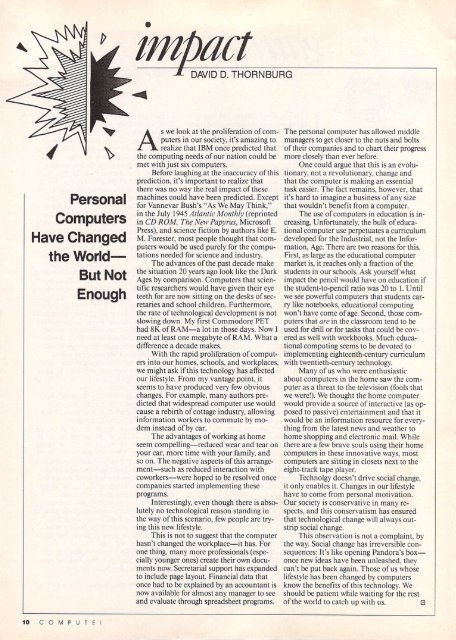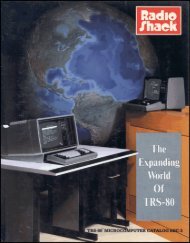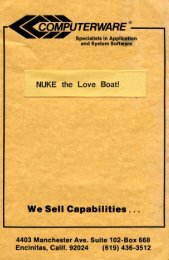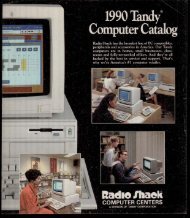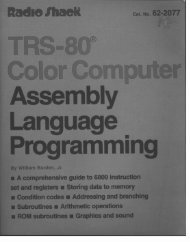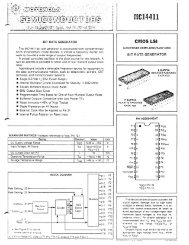Who Works at Home, Why, and How You Can Join Them How ...
Who Works at Home, Why, and How You Can Join Them How ...
Who Works at Home, Why, and How You Can Join Them How ...
Create successful ePaper yourself
Turn your PDF publications into a flip-book with our unique Google optimized e-Paper software.
impact<br />
DAVID D.THORNBURG<br />
V<br />
Personal<br />
Computers<br />
Have Changed<br />
the World—<br />
But Not<br />
Enough<br />
As we look <strong>at</strong> the prolifer<strong>at</strong>ion of com<br />
puters in our society, it's amazing to<br />
realize th<strong>at</strong> IBM once predicted th<strong>at</strong><br />
in CD ROM, The New Papyrus, Microsoft<br />
Press), <strong>and</strong> science fiction by authors like E.<br />
M. Forester, most people thought th<strong>at</strong> com<br />
puters would be used purely for the compu<br />
t<strong>at</strong>ions needed for science <strong>and</strong> industry'-<br />
The advances of the past decade make<br />
the situ<strong>at</strong>ion 20 years ago look like the Dark<br />
Ages by comparison. Computers th<strong>at</strong> scien<br />
tific researchers would have given their eye<br />
teeth for are now sitting on the desks of sec<br />
retaries <strong>and</strong> school children. Furthermore,<br />
the r<strong>at</strong>e of technological development is not<br />
slowing down. My first Commodore PET<br />
had 8K of RAM—a lot in those days. Now I<br />
need <strong>at</strong> least one megabyte of RAM. Wh<strong>at</strong> a<br />
difference a decade makes.<br />
With the rapid prolifer<strong>at</strong>ion of comput<br />
ers into our homes, schools, <strong>and</strong> workplaces.<br />
we might ask if this technology has affected<br />
our lifestyle. From my vantage point, it<br />
seems to have produced very few obvious<br />
changes. For example, many authors pre<br />
dicted th<strong>at</strong> widespread computer use would<br />
cause a rebirth of cottage industry; allowing<br />
inform<strong>at</strong>ion workers to commute by mo<br />
dem instead of by car.<br />
The advantages of working <strong>at</strong> home<br />
seem compelling—reduced wear <strong>and</strong> tear on<br />
your car, more time with your family, <strong>and</strong><br />
so on. The neg<strong>at</strong>ive aspects of this arrange<br />
ment—such as reduced interaction with<br />
coworkers—were hoped to be resolved once<br />
companies started implementing these<br />
programs.<br />
Interestingly, even though there is abso<br />
lutely no technological reason st<strong>and</strong>ing in<br />
the way of this scenario, few people arc try<br />
ing this new lifestyle.<br />
This is not to suggest th<strong>at</strong> the computer<br />
hasn't changed the workplace—it has. For<br />
one thing, many more professionals (espe<br />
cially younger ones) cre<strong>at</strong>e their own docu<br />
ments now. Secretarial support has exp<strong>and</strong>ed<br />
to include page layout. Financial d<strong>at</strong>a th<strong>at</strong><br />
once had to be explained by an accountant is<br />
now available for almost any manager to see<br />
<strong>and</strong> evalu<strong>at</strong>e through spreadsheet programs.<br />
The personal computer has allowed middle<br />
managers to get closer to the nuts <strong>and</strong> bolts<br />
of their companies <strong>and</strong> to chart their progress<br />
the computing needs of our n<strong>at</strong>ion could be more closely than ever before.<br />
met with just six computers.<br />
Before laughing <strong>at</strong> the inaccuracy of this<br />
prediction, it's important to realize th<strong>at</strong><br />
there was no way the real impact of these<br />
machines could have been predicted. Except<br />
for Vannevar Bush's "As We May Think," th<strong>at</strong><br />
in the July 1945 Atlantic Monthly (reprinted<br />
One could argue th<strong>at</strong> this is an evolu<br />
tionary, not a revolutionary, change <strong>and</strong><br />
th<strong>at</strong> the computer is making an essential<br />
task easier. The fact remains, however, th<strong>at</strong><br />
it's hard to imagine a business of any size<br />
wouldn't benefit from a computer.<br />
The use of computers in educ<strong>at</strong>ion is in<br />
creasing. Unfortun<strong>at</strong>ely, the bulk of educa<br />
tional computer use perpetu<strong>at</strong>es a curriculum<br />
developed for the Industrial, not the Infor<br />
m<strong>at</strong>ion, Age. There are two reasons for this.<br />
First, as large as the educ<strong>at</strong>ional computer<br />
market is, it reaches only a fraction of the<br />
students in our schools. Ask yourself wh<strong>at</strong><br />
impact the pencil would have on educ<strong>at</strong>ion if<br />
the student-to-pencil r<strong>at</strong>io was 20 to 1. Until<br />
we see powerful computers th<strong>at</strong> students car<br />
ry like notebooks, educ<strong>at</strong>ional computing<br />
won't have come of age. Second, those com<br />
puters th<strong>at</strong> are in the classroom tend to be<br />
used for drill or for tasks th<strong>at</strong> could be cov<br />
ered as well with workbooks. Much educa<br />
tional computing seems to be devoted to<br />
implementing eighteenth-century curriculum<br />
with twentieth-century technology.<br />
Many of us who were enthusiastic<br />
about computers in the home saw the com<br />
puter as a thre<strong>at</strong> to the television (fools th<strong>at</strong><br />
we were!). We thought the home computer<br />
would provide a source of interactive (as op<br />
posed to passive) entertainment <strong>and</strong> th<strong>at</strong> it<br />
would be an inform<strong>at</strong>ion resource for every<br />
thing from the l<strong>at</strong>est news <strong>and</strong> we<strong>at</strong>her to<br />
home shopping <strong>and</strong> electronic mail. While<br />
there are a few brave souls using their home<br />
computers in these innov<strong>at</strong>ive ways, most<br />
computers are sitting in closets next to the<br />
eight-track tape player.<br />
Technolgy doesn't drive social change,<br />
it only enables it. Changes in our lifestyle<br />
have to come from personal motiv<strong>at</strong>ion.<br />
Our society is conserv<strong>at</strong>ive in many re<br />
spects, <strong>and</strong> this conserv<strong>at</strong>ism has ensured<br />
th<strong>at</strong> technological change will always out<br />
strip social change.<br />
This observ<strong>at</strong>ion is not a complaint, by<br />
the way. Social change has irreversible con<br />
sequences: It's like opening P<strong>and</strong>ora's box—<br />
once new ideas have been unleashed, they<br />
can't be put back again. Those of us whose<br />
lifestyle has been changed by computers<br />
know the benefits of this technology. We<br />
should be p<strong>at</strong>ient while waiting for the rest<br />
of the world to c<strong>at</strong>ch up with us. q<br />
10 COMPUTE


